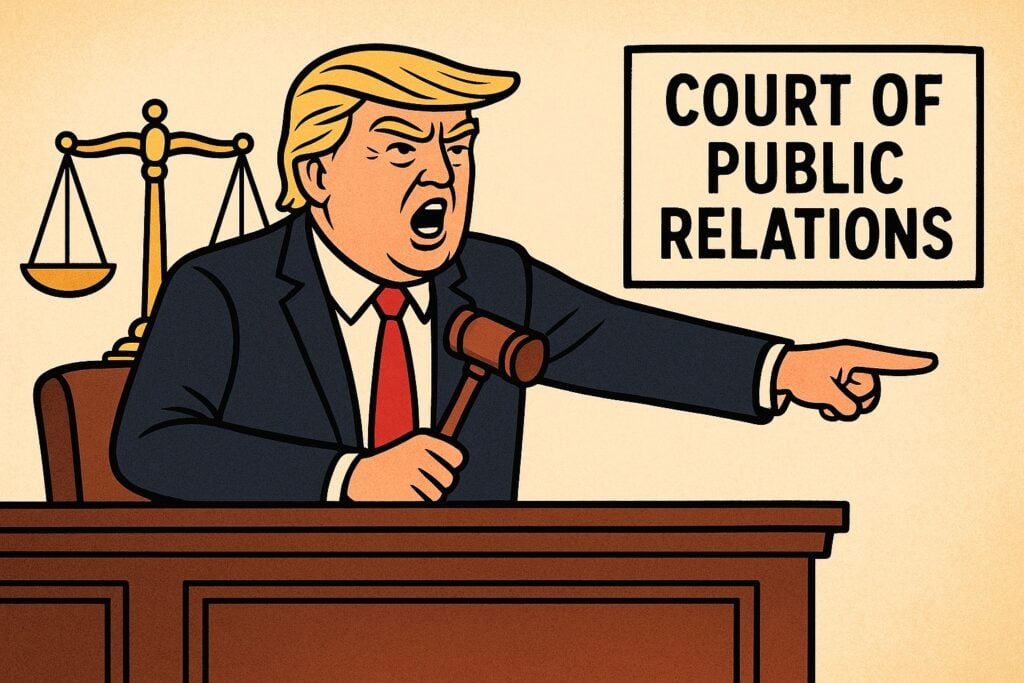
It’s becoming clearer as time goes on that the more eye-popping the sum of money Trump demands from media outlets in lawsuits alleging defamation, the more likely these lawsuits are not serious, but public relations stunts aimed at generating sensational headlines that will intimidate critics and media outlets.
Case in point: Trump’s 85-page lawsuit against the New York Times charging defamation (pdf, 85 pages) that his attorneys filed September 15, 2025.
The lawsuit railed against the Times and reads like an over-the-top, complimentary puff piece about Trump, heaping fawning praise on him with statements like:
“President Trump won the 2024 Presidential Election over Vice President Kamala Harris in historic fashion, emerging victorious in both the Electoral College and the popular vote, and securing a resounding mandate from the American people….With the overwhelming victory, President Trump secured the greatest personal and political achievement in American history.”
and,
“’The Apprentice’ represented the cultural magnitude of President Trump’s singular brilliance, which captured the zeitgeist of our time.”
Steven D. Merryday, the U.S. District Court Judge assigned to the case, pointed out that a person reading the lawsuit has to wade through 80 pages of it before getting to the first allegation, and the second allegation appears on page 83 of the 85-page filing. He recognized the excessive, redundant grandstanding in the lawsuit and chastised Trump’s attorneys over the filing, saying the law requires such cases to be “simple, concise and direct.”
The judge said in part,
“As every lawyer knows (or is presumed to know), a complaint is not a public forum for vituperation and invective — not a protected platform to rage against an adversary. A complaint is not a megaphone for public relations or a podium for a passionate oration at a political rally or the functional equivalent of the Hyde Park Speakers’ Corner.”
Judge Merryday tossed Trump’s defamation lawsuit just four days after his attorneys filed it.
In his 4-page ruling striking down the suit (pdf), Judge Merryday wrote,
“This complaint stands unmistakably and inexcusably athwart the requirements of Rule 8. This action will begin, will continue, and will end in accord with the rules of procedure and in a professional and dignified manner. The complaint is STRUCK with leave to amend within twenty-eight days. The amended complaint must not exceed forty pages, excluding only the caption, the signature, and any attachment. “

The Times praised the judge’s ruling and called Trump’s lawsuit a “political document rather than a serious legal filing.”
But that was the point.
Filing meritless, poorly-written lawsuits is a strategy Trump is using to intimidate media outlets.
The lawsuits aren’t the point, so it doesn’t matter how little actual evidence they cite or how poorly they are written.
The impact of the headlines they generate is the singular point.
A full-page ad in the New York Times costs from $100,000 to $1 million, depending on colors used, the days of the week it runs, where it is placed in the paper, etc., and most people who will see it probably live in or around the state of New York. On the other hand, a single attorney charging $500 an hour will cost a fraction of the cheapest major newspaper ad, and filing fees for a defamation lawsuit are only a few hundred dollars, but just the act of filing even a hastily composed, poorly written lawsuit utterly devoid of any real merit generates news coverage by most major news outlets across the country — and even the world — with headlines guaranteed to send chills through most major media outlets. And since most people only read headlines and don’t follow these lawsuits to their conclusions, the damage is done. Trump can use such frivolous lawsuit filings to get the impact he wants — intimidation of large numbers of major media outlets — at a fraction of the cost of a big PR campaign to present his point of view, without suffering any consequences at all for abusing the courts by utilizing them as a PR tool.
Watch for a similar failure of the $10 billion defamation lawsuit Trump filed against the Wall Street Journal (WSJ) in July over Trump’s alleged letter in Epstein’s 50th Birthday Book, which turned out to be exactly as the WSJ article had described it, since the truth is a defense against defamation.

I read most of this compliant and it was the worst drafted one I have ever seen in 50 years being a lawyer. It does not follow any of the rules of federal practice. The first part of any federal claim is to state how the plaintiff has federal jurisdiction and they didn’t do that properly and it went downhill from there. Trump’s lawyers are getting worse and worse and it is hard to believe many of them have ever actually passed a bar exam. I was surprised the judge didn’t sanction the lawyers for gross ineptitude wasting the court’s time.